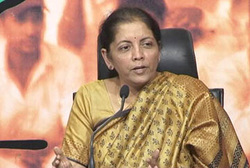
NEW DELHI - India Aug 6 blamed the rich nations for a deadlock on global trade talks in Geneva last week and said they were unwilling to discuss other issues of importance to developing countries, such as permanent solution on food subsidy. "Some developed countries were reluctant to engage on other issues," Commerce Minister Nirmala Sitharaman told the Lok Sabha, the upper house, referring to the efforts...

at the Geneva meet to agree on a pact to simplify rules on global commerce before July 31. "India, therefore, took the stand that till there is an assurance to finding a permanent solution to public stockpiling and all other Bali deliverables, it will be difficult to join the consensus on the protocol for amendment on trade facilitation," she said.
Spelling out India's stand during the talks at the World Trade Organization (WTO), the minister said the previous ministerial meeting at Bali negotiated the various issues as a single package, and that spirit must be kept. "It is regrettable that today the WTO is unable to agree even to fast track negotiations on an issue of such importance to millions of subsistence farmers across the developing world, while the rich world continues to subsidize its farmers unabatedly." At a meeting of trade diplomats of 160 member countries of the WTO in Geneva last week, India decided to veto an accord on trade facilitation, saying a parallel solution must be found on the permissible subsidy on procurement of food for public distribution.
The WTO wants a freeze on the extent to which governments can buy farm produce at non-market rates. Towards this, the 9th Ministerial Conference at Bali in 2013 had called for a permanent solution by the 11th such conference due in 2017. It was also agreed that till 2017, no country can move the dispute settlement body of the WTO against another member if its government was found to be breaching the level of subsidy freeze that was permitted - this was officially termed as the peace clause.
India's concern has been: What if no permanent solution is found by 2017? In such an event, the peace clause will expire and member countries would be free to drag India to the WTO - and the outcome would not have been in New Delhi's favor.
The Trade Facilitation Agreement (TFA), a global reform of customs rules and procedures, aims to improve the efficiency of trade across borders, that is potentially seen as adding $1 trillion to global trade and creating 21 million jobs. "We reiterate our commitment to WTO," Sitharaman said. "Timely correction of imbalances in the working of the system of its rules is critical to ensure that WTO is impartial and fair in the interests of all its members, and not just a select few."
Spelling out India's stand during the talks at the World Trade Organization (WTO), the minister said the previous ministerial meeting at Bali negotiated the various issues as a single package, and that spirit must be kept. "It is regrettable that today the WTO is unable to agree even to fast track negotiations on an issue of such importance to millions of subsistence farmers across the developing world, while the rich world continues to subsidize its farmers unabatedly." At a meeting of trade diplomats of 160 member countries of the WTO in Geneva last week, India decided to veto an accord on trade facilitation, saying a parallel solution must be found on the permissible subsidy on procurement of food for public distribution.
The WTO wants a freeze on the extent to which governments can buy farm produce at non-market rates. Towards this, the 9th Ministerial Conference at Bali in 2013 had called for a permanent solution by the 11th such conference due in 2017. It was also agreed that till 2017, no country can move the dispute settlement body of the WTO against another member if its government was found to be breaching the level of subsidy freeze that was permitted - this was officially termed as the peace clause.
India's concern has been: What if no permanent solution is found by 2017? In such an event, the peace clause will expire and member countries would be free to drag India to the WTO - and the outcome would not have been in New Delhi's favor.
The Trade Facilitation Agreement (TFA), a global reform of customs rules and procedures, aims to improve the efficiency of trade across borders, that is potentially seen as adding $1 trillion to global trade and creating 21 million jobs. "We reiterate our commitment to WTO," Sitharaman said. "Timely correction of imbalances in the working of the system of its rules is critical to ensure that WTO is impartial and fair in the interests of all its members, and not just a select few."

 RSS Feed
RSS Feed
